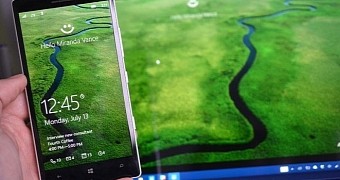The next-year iPhone is going to be quite a major overhaul in many regards, mostly because Apple wants to celebrate the 10th anniversary of the iPhone in style.
As a result, the company is working on several hardware upgrades that would not only improve the existing features, but also add new ones to bolster security and performance.
Apple analyst KGI Ming-Chi Kuo says that one such feature is a full-face recognition system that could become available on a future iPhone model. Unfortunately, it’s very unlikely that this feature makes its way on the iPhone 8 planned for this fall.
Specifically, it all starts with Apple’s plans of making an iPhone with zero bezels. Because of the new form factor, the company can no longer use the existing capacitive sensor that’s currently available on the iPhone, so what Cupertino wants to do is switch to an optical sensor that would be installed under the screen.
This allows the iPhone to come with a zero-bezel design and, at the same time, to offer a fingerprint sensor under the display which would be enabled when the user touches the panel. This isn’t the first time we’re hearing about an iPhone coming with a fingerprint sensor integrated into the screen, and it looks like Apple is working at full speed on getting it ready.
Long-term bet on biometrics
But the transition to the optical sensor is just part of the plan. According to the analyst, Apple’s long-term goal is to get rid of the sensor completely and replace it with biometrics that would also bolster security of the iPhone. But until this is doable, the optical fingerprint sensor is just the perfect temporary solution.
As for the biometrics improvements coming on the iPhone, it looks like Apple isn’t willing to go for a widely-adopted solution such as the iris scanner, but for a full-face recognition system that would be even more secure. This would help eliminate the fingerprint sensor entirely, but Apple wants to do that only when the new system is advanced enough to provide a super-low authentication failure rate.
On the other hand, do not expect the new biometrics system to debut on the 2017 iPhone, as this is still work in progress at Apple and the next model is very likely to come with a fingerprint sensor (either capacitive or optical).

 14 DAY TRIAL //
14 DAY TRIAL //